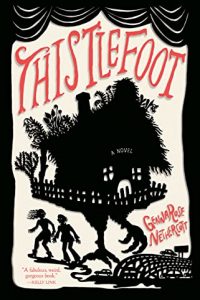Faren Miller reviews Jennifer Mason-Black
Devil and the Bluebird, Jennifer Mason-Black (Amulet 978-1-4197-2000-0, $17.95. 330pp, hc) Cover by Monica Ramos. May 2016.
 A powerful debut novel, Jennifer Mason-Black’s Devil and the Bluebird begins with a teenager’s memories of what had been her mother’s guitar, as she stands at a dirt crossroad on a chilly, moonless night with the instrument strapped to her back, hoping to make a deal with something like a devil. When a barefoot woman in a red dress appears (‘‘a pair of red high heels dangling from one hand’’), she knows that Blue Riley’s family nickname is Bluebird and tells her, ‘‘There’s nothing private when you wait for me at midnight at the crossroads, little girl.’’ She likes that the girl ‘‘came prepared’’ – with the guitar – but this deal won’t trade a soul for otherworldly musical prowess (as legend generally has it).
A powerful debut novel, Jennifer Mason-Black’s Devil and the Bluebird begins with a teenager’s memories of what had been her mother’s guitar, as she stands at a dirt crossroad on a chilly, moonless night with the instrument strapped to her back, hoping to make a deal with something like a devil. When a barefoot woman in a red dress appears (‘‘a pair of red high heels dangling from one hand’’), she knows that Blue Riley’s family nickname is Bluebird and tells her, ‘‘There’s nothing private when you wait for me at midnight at the crossroads, little girl.’’ She likes that the girl ‘‘came prepared’’ – with the guitar – but this deal won’t trade a soul for otherworldly musical prowess (as legend generally has it).
Music and the essence of souls are central to this novel in other ways: connected to love and loss, open to possibilities more elusive than dreams of prowess leading to fame and fortune. What drives Blue is a need to find her missing sister Cass. Long after their mother settled in a small Maine town to die of cancer (estranged from former bandmate/songwriting partner Tish and the life they shared), Cass left the home these sisters had made with their aunt, an ordinary woman who never really feels like family as much as Tish had. Cass’s phone calls on their dead mother’s birthday sustain Blue more than she realized, till they abruptly cease. At the crossroads she recalls ‘‘how they sang together, and it was like being inside and outside herself at the same time, like being the world.’’ Now that the last of that world seems gone, Blue will do anything she can to reclaim it.
The woman in red takes Blue’s voice, down to the least whisper, in exchange for an uncanny impulse to travel manifested in a pair of boots that urge her westward (growing more painful whenever she stops too long). Since this is modern America, Devil and the Bluebird swiftly moves from a dusty country crossroad to thoroughfares and highways where Blue hitchhikes – communicating with the people she meets by writing in a notebook. Since she doesn’t want to be tracked, it’s not an e-book, yet her notes read like texting: lots of abbreviations and emojis. The attitude toward expletives is just as nonchalant. As Blue regards it, ‘‘swearing… made everything okay faster. You said the words, and they were like rocks, then spears, then swords; then at some point they reached an atomic level and the fight was over.’’
Taking elements from Road Book and YA, this novel probes beneath the surface – finding as much uncertainty, passion, and soul-endangering choices in a band’s encounters with Reality TV (a subplot that grows crucial toward book’s end) as in old deals with the demonic. Blue’s sense for ‘‘wrongness’’ around her may have been roused at the crossroads, but on the road it becomes a basic survival skill – some devils are human. Her friendship with another teenage traveler forms the heart of the book: avoiding blatant issue-mongering yet touching on intimate matters of self and sexual identity that culture and family values can’t quell, or politics set altogether free.
During a strange hiatus, Blue stumbles into a temporal ‘‘eddy’’ (still anchored in our mortal world) where she gets answers to questions she hadn’t known enough to ask. While some involve family, others spur her to find her own way into music, through the songs she’s finally trying to write. This could be her world. She feels its presence when she learns she saw a ghost at a barn dance: ‘‘Instruments, voices… Musicians play in the midst of ghosts every day.’’ Though she confirms his identity by tracking down a photo on the Internet, seeing that image makes her realize the game is still afoot. Soon she’ll be moving on, beyond the echoes.
Jennifer Mason-Black knows how to find wonder in the messy stuff of our world: a bus graveyard, a diner, a TV game where players stray from their scripted songs. It may not conjure many spirits, yet music is the true magic here.







